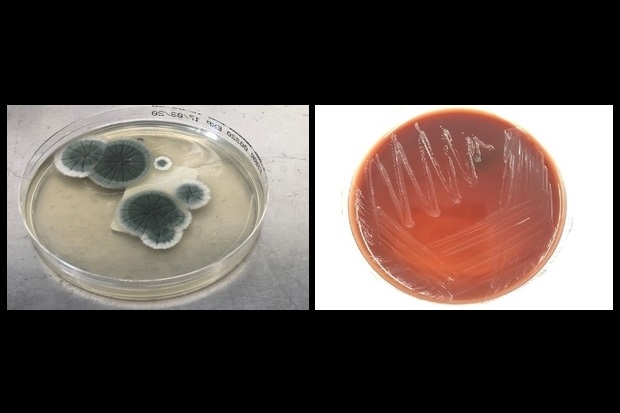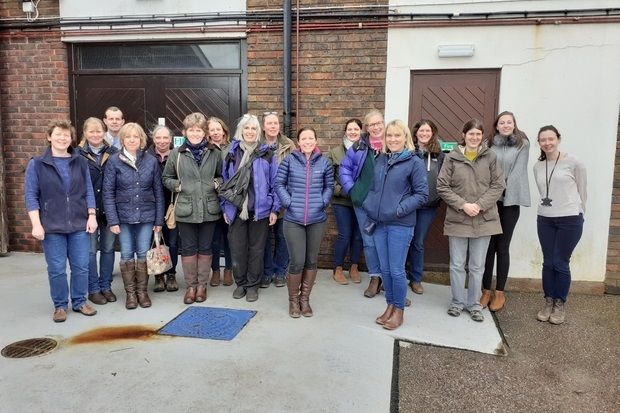In this blog, Veterinary Investigation Officer (VIO), Harriet McFadzean discusses a recent visit to Starcross Veterinary Investigation Centre (VIC) made by the Exmoor Women in Farming group.
APHA’s Starcross VIC hosted 14 ladies from the Exmoor Women in Farming group in February. The group was set up as part of the wider Exmoor Hill Farm Project, receiving support from the Princes Countryside Fund and the Exmoor National Park Authority with the aim to ‘address low farming incomes and rural isolation through networking and training events.’ The 175 female group members play diverse roles in farming businesses but share the common experiences of moorland life and a progressive, forward thinking attitude to farming. Regular meetings and training events organised by the group provide key skills in a range of areas such as mechanics, book keeping, first aid and animal husbandry whilst offering the opportunity to meet with friends, share helpful tips and act as a safe space to discuss matters when times are tough.

As a VIO, my job aims to detect new and emerging disease threats to Great Britain, which is partly delivered by offering a diagnostic service to farmers through their private vet. On a day-to-day basis, post mortem examinations of livestock and diagnostic testing of animal samples help us achieve this; my colleague Adrienne sums up our role perfectly in a previous blog post. None of our work would be possible without engagement of private veterinarians and farmers who choose to submit samples to our VICs, or phone us when they see unusual and possibly ‘novel’ disease outbreaks. Engagement with private vets and farmers is not only vital, but also one of the most enjoyable parts of our diverse job role, which is why I have chosen to blog about it!
The Exmoor Women in Farming group started their day at Starcross VIC with all important tea, cake and conversation (Starcross VIC is excellent at all three). The number of women in agricultural roles in the UK is increasing, with a recent survey stating that 59% of participants felt the agricultural industry offered equal or better opportunities for women than other industries. The roles women play in farming businesses are also changing. This was demonstrated by the group, with many members playing large roles in day-to-day farm work alongside financial planning, running a household, and in many cases holding down another job! There were also some interesting examples of diversification such as a cheese making business, and running tourism ventures. After getting to know one another I delivered a talk to the group, explaining what the role of a VIC is, why post mortems can be useful in improving farm animal health and welfare and what gets done with the data we collect.
After yet more tea and cake, the group enjoyed a tour of the laboratory and post mortem room facilities. Each of the individual testing departments provided a short overview of their activities and had some interesting work to show the visitors. As Exmoor farmers whose cattle and sheep graze extensive upland areas, the disease issues raised as most important by the group included parasite infections in ruminants, and, given the time of year, abortion in sheep. Antimicrobial resistance was also a concern. During the tour the group were able to see how we test for these conditions. In bacteriology, agar plates were seen, growing organisms capable of causing abortion in livestock, and in parasitology, a worm egg count demonstrated the appearance of gastrointestinal worm eggs in sheep faeces. Microscope slides also showed how organisms such as Chlamydophila abortus, the causative agent of enzootic abortion (the most common cause of abortion in sheep) are detected, and disc diffusion plates, testing the effectiveness of antibiotics on different organisms, highlighted our work on preventing antimicrobial resistance.

The group thoroughly enjoyed their visit and lots of questions were asked along the way, both about the diseases we test for, and also what happens with the surveillance data collected. Many of the visitors commented on the wealth of surveillance ‘data gathering’ that goes on behind the scenes and highlighted that they were unaware of the breadth of work carried out by the agency as a whole. More information about how APHA analyses surveillance data is available in another recent blog.
This visit was organised as part of an effort to increase engagement and hence disease surveillance across areas with extensively managed livestock. Extensively-managed animals are those that are kept in such a way that they are not easily regularly and closely inspected, for signs of ill health, or significantly altered production and includes mainly cattle and sheep, for example animals kept on moorland. The APHA Centre of Expertise for Extensively Managed Livestock, based in Carmarthen, aims to increase the health and welfare of these animals by providing expertise and disseminating information, whilst addressing the ‘surveillance gap’ these areas represent. Find out more about the centre in an earlier blog.
Not only was hosting this visit great fun due to the enthusiasm and engagement shown by the group, it gave the staff at Starcross the opportunity to showcase their expertise, and also learn from and better understand the farmers which provide a vital contribute to our work.

Enjoyed reading? Then why not subscribe to the APHA Science Blog

2 comments
Comment by Alan Wight posted on
An excellent and interesting blog: well done to Harriet, Rachael, Andrew and indeed all the Starcross team for providing an enjoyable, enriching and informative visit for the Exmoor Women in Farming group which I know was very much appreciated.
Comment by Christine posted on
That was really interesting, I was on leave when this happened and was sad to have missed it. Our role is an important one for the Exmoor Women in Farming group, once the COVID 19 is over perhaps we could do it all again with the next group.